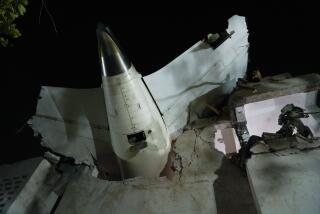205 Die in Jet Crash Near Taipei Airport
- Share via
TAIPEI, Taiwan — A China Airlines jet trying to land in fog crashed in a country neighborhood Monday, knocking the roofs off houses before skidding into a rice paddy and exploding in flames. Authorities said all 196 people aboard and nine on the ground were killed.
The airline said the dead among the 182 passengers and 14 crew members included Sheu Yuan-dong, governor of Taiwan’s central bank, and other key financial officials; many Taiwanese families returning from vacations in Bali, Indonesia; and four Americans. Victims on the ground included a 2-month-old baby.
China Airlines released the names but not the hometowns of the four Americans aboard. The names appeared to be those of three men and a woman.
Firefighters went house to house in the blackened neighborhood, putting out the flames licking doors and windows and searching for survivors. Searchlights illuminated a life raft from the Airbus A-300 wrapped around a broken tree stump. Seats from the plane were scattered in the dirt, one with a body trapped beneath it.
Witnesses said the airliner hit hundreds of yards short of the runway at Chiang Kai-shek Airport, 25 miles west of Taipei. It tore through the second floors of homes strung along a highway before sliding to a stop in flames.
“I heard a blast and was scared to death. Parts of the house started to fall down,” said Chen Ah-mei, who had to crawl out of the ruins of her home on her hands and knees. She and her husband were being treated at a hospital.
“It happened so fast--noise and fire,” said an elderly farmer who ran to the scene as soon as he saw the flames. He identified himself only as Chen.
The fiery impact scattered charred bodies and body parts along the road and throughout the sparsely populated area, home to fish farms, small factories and warehouses. The smell of jet fuel and burning rubber lingered hours after the crash. Only the tail of the broken, burned jet was recognizable.
Authorities sealed off the neighborhood, leaving families of passengers to congregate at hospitals and the airport. Relatives broke into tears and fell into one another’s arms as the extent of the disaster hit them; one woman collapsed to the floor.
“They all went to Bali on a trip--and they are all dead,” said a woman whose four children were on the flight.
*
Tsai Tuei, director of the Civil Aeronautics Administration, resigned to take moral responsibility for the crash, which was the worst in the airport’s history. It came after Taiwan’s flagship carrier embarked on an extensive safety campaign in the wake of a 1994 crash in Japan that claimed 264 lives.
Airport officials said two flight data recorders were recovered and were being analyzed to help determine the cause of the accident.
The twin-engine Airbus went down as it attempted to land on its second approach at 8:09 p.m. at the airport’s northern runway, Taipei-based China Airlines said.
Heavy fog was reported around the airport throughout the afternoon and evening, and a light rain was falling at the time of the crash.
The plane had been directed to make the second approach because of poor visibility, said Hamilton Liu, a China Airlines spokesman. Earlier, the Civil Aeronautics Administration had said the visibility was reported to be adequate.
Vice Transportation Minister Chen Shih-chi said the pilot’s overall line of descent was too low, but it was not clear why.
Sheu, the central bank governor, his wife and four other finance officials returning from a conference in Bali were among the passengers on flight CI-676. The officials included Chen Huang, head of the bank’s department of foreign exchange, and Chien Chi-min, head of the department of economic research.
Sheu had helped create a strong banking system that has survived the recent economic turmoil in Asia and probably will remain solid despite his death.
He and other central bank officials played a key role in helping Taiwan’s economy escape the brunt of the financial problems. Backed by Taiwan’s foreign reserves, they were able to spend billions of dollars to defend the Taiwan currency and make it more difficult for speculators to target it.
Two years ago, Sheu and other bank officials addressed the kinds of faulty banking practices that have gotten many Asian countries into trouble.
They saw to it that banks cut down their loans and did not invest extensively in troubled companies or the real estate market. Sheu was known for his skillful management of Taiwan’s foreign reserves.
“My job is to keep the reserves at a level you all feel comfortable about,” he said during a recent financial meeting in Taipei.
At the Bali meeting, Sheu promised to pump $1.2 billion through Taiwanese bank branches to cash-strapped businesses in Southeast Asia, which have been rocked by currency and credit troubles.
A visibly shaken government spokesman, Chen Chien-jen, praised the 70-year-old Sheu’s fiscal expertise, saying it put Taiwan’s banking system on a “firm, steady footing.”
*
In a statement, Airbus Industrie--based in Toulouse, France--said the plane that crashed was delivered to China Airlines from the production line in December 1990. By the end of January, the aircraft had accumulated about 20,070 flight hours in about 8,800 flights, Airbus said.
In 1994, a China Airlines A300-600R exploded and burned during an aborted landing in Nagoya, Japan, killing 264 people.
The airline has had four other crashes since 1986. After the 1994 Nagoya crash, it embarked on an extensive safety program that included pilot retraining.
More to Read
Sign up for Essential California
The most important California stories and recommendations in your inbox every morning.
You may occasionally receive promotional content from the Los Angeles Times.












